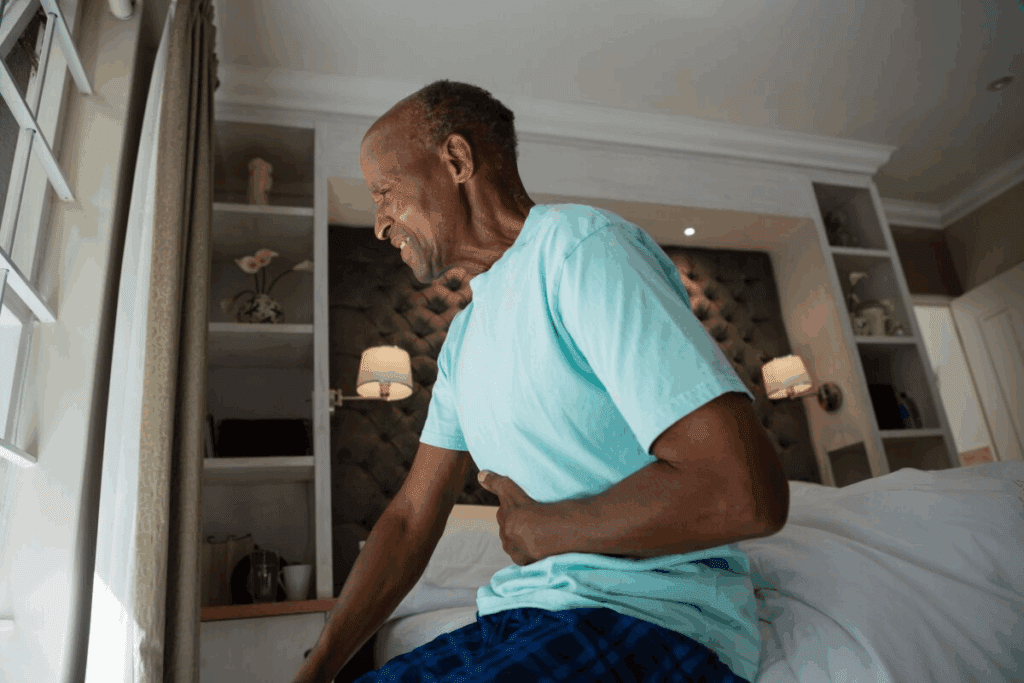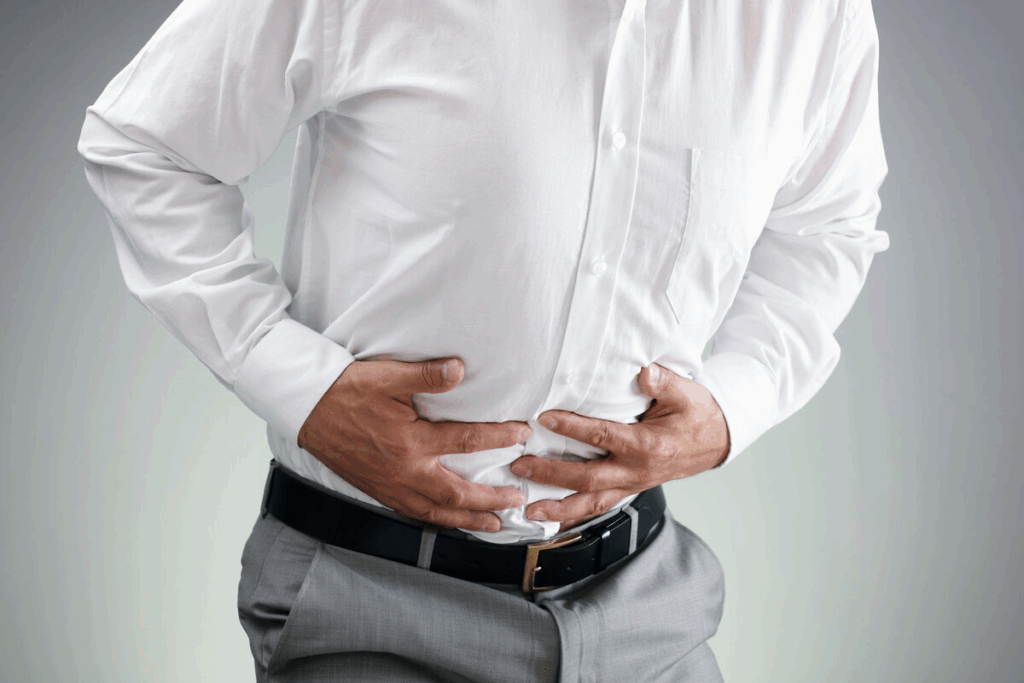Last Updated on November 26, 2025 by Bilal Hasdemir

After a cholecystectomy, or gallbladder removal surgery, many wonder if they can drink. The gallbladder stores bile from the liver, helping with fat digestion. But, removing it doesn’t stop the body from processing alcohol. Can You Drink Without a Gallbladder? The Honest Truth Get the honest truth. Learn how alcohol affects your body and the risks you need to know.
Studies show most people can have alcohol once they’ve fully recovered from surgery. At Liv Hospital, doctors say the gallbladder’s role in digestion is important. Yet, not having one doesn’t mean you have to give up alcohol.

The gallbladder is a key part of the digestive system. It stores bile from the liver. This small organ helps break down fats.
The gallbladder holds bile, a digestive fluid from the liver. When you eat fatty foods, it releases bile into the small intestine. This helps break down fats for easier digestion.
Bile Storage and Release Mechanism: Hormones control when the gallbladder releases bile. When fatty foods reach the small intestine, a hormone called cholecystokinin (CCK) is released. This hormone makes the gallbladder contract.
Bile is key for digesting fats and vitamins that need fats to be absorbed. It breaks down fats into smaller pieces. This makes it easier for enzymes to digest them.
| Bile’s Role | Description |
| Emulsification | Breaks down fats into smaller droplets |
| Absorption | Aids in the absorption of fat-soluble vitamins (A, D, E, K) |
The gallbladder and liver work together in digestion. The liver makes bile, which the gallbladder stores. When released, bile helps digest fats in the small intestine. This teamwork is essential for good digestion and nutrient absorption.
The liver, gallbladder, and small intestine work together. This complex process ensures nutrients are digested and absorbed properly.

Cholecystectomy, or gallbladder removal, is done for several reasons. It’s needed to fix health problems linked to the gallbladder.
Gallstones are a main reason for gallbladder removal. These hard, pebble-like pieces of bile can cause a lot of pain. When they start causing symptoms, cholecystectomy is often the best choice.
Gallstones can lead to inflammation of the gallbladder (cholecystitis), pancreatitis, or blockage of the bile ducts. In these cases, removing the gallbladder is usually the best treatment.
Other health issues can also require gallbladder removal. These include:
In some cases, the gallbladder doesn’t work right, causing chronic pain or digestive problems. Cholecystectomy might be an option for these issues.
There are different ways to remove the gallbladder, including:
The choice of surgery depends on the patient’s health, any complications, and the surgeon’s opinion.
Gallbladder surgery changes how the body processes bile and digests fats. After the surgery, the gallbladder is gone, and bile goes straight to the small intestine. This new way of processing bile can cause digestive changes as the body adjusts.
The gallbladder stores bile from the liver and releases it to help digest fats. Without it, bile flows all the time into the small intestine. This can affect how fats are digested and absorbed.
Most people get used to this change without lasting problems. But, some might feel uncomfortable at first.
The body tries to adjust by making the bile ducts bigger. But, the main change is how the small intestine handles the constant bile flow.
After gallbladder surgery, people might feel a few things. These include:
These symptoms usually go away as the body gets used to the new bile flow. Eating differently can help with these symptoms.
How long it takes to adjust to life without a gallbladder varies. The biggest changes usually happen in the first few weeks or months. This is when the body gets used to bile flowing all the time into the small intestine.
Most people find their digestive symptoms get better over time as they adapt. But, some might need to change their diet for good to keep their digestive health up.
Knowing about these changes and making the right lifestyle changes can help. This way, people can reduce discomfort and keep their digestive system healthy after gallbladder surgery.
The process of alcohol metabolism is complex and involves multiple organs, with the liver playing a central role. Alcohol metabolism is essential for eliminating alcohol from the body. It can significantly impact an individual’s tolerance and response to alcohol consumption.
The liver is the primary site for alcohol metabolism. It contains enzymes such as alcohol dehydrogenase (ADH) and aldehyde dehydrogenase (ALDH). These enzymes break down alcohol into acetaldehyde and then into acetate. This is eventually metabolized into water and carbon dioxide.
The liver’s capacity to metabolize alcohol can be influenced by several factors, including overall liver health and the presence of other substances that may compete for the same metabolic pathways. For instance, chronic alcohol consumption can lead to liver damage. This impairs its ability to metabolize alcohol efficiently.
While the liver is responsible for metabolizing alcohol, the digestive system plays a key role in alcohol absorption. Alcohol is absorbed mainly in the stomach and small intestine. It is then transported to the liver via the bloodstream.
Several factors can affect how efficiently alcohol is metabolized in the body. These include:
It’s also worth noting that gender, body weight, and overall health can influence alcohol metabolism. For example, women generally metabolize alcohol more slowly than men. This is due to differences in body composition and enzyme activity.
Understanding these factors is essential for appreciating how alcohol is metabolized in the body. This knowledge is important for those who have undergone gallbladder removal surgery. They may need to adjust their alcohol consumption habits.
People without a gallbladder often wonder if they can drink alcohol safely. The gallbladder helps digest food and affects how we process alcohol. These factors are important to think about.
After surgery to remove the gallbladder, digesting fats and absorbing certain vitamins can be harder. But, most studies say it’s okay to drink in moderation after you’ve healed.
Research has looked into how alcohol affects those who’ve had their gallbladder removed. It found that not having a gallbladder doesn’t stop the body from breaking down alcohol.
The liver keeps making bile, which helps digest fats. But, not having a gallbladder can change how bile moves. This might affect how well we digest food.
Doctors agree that most people can have a little alcohol after gallbladder surgery. But, what’s considered “a little” can vary from person to person.
For women, it’s usually one drink a day. For men, it’s up to two. Drinking more can cause problems, even without a gallbladder.
| Drinking Category | Definition | Potential Risks |
| Moderate Drinking | Up to 1 drink/day for women, up to 2 drinks/day for men | Generally safe, but monitor digestive symptoms |
| Excessive Drinking | Beyond moderate drinking limits | Increased risk of digestive issues, liver strain |
Everyone’s body reacts differently to alcohol, whether they have a gallbladder or not. Things like age, sex, weight, and health play a big role.
After gallbladder surgery, some people might notice changes in how they feel after drinking. It’s a good idea to pay attention to how your body reacts and adjust your drinking habits.
Key Considerations:
Knowing when to drink alcohol after gallbladder surgery is key for a smooth recovery. The time right after surgery is very important. Taking the right steps can help avoid problems.
It’s best to avoid alcohol after gallbladder surgery. Alcohol can stress the liver more, as it works harder without the gallbladder. Avoiding alcohol lets the liver work better, lowering the chance of problems.
Also, alcohol can upset the stomach, causing discomfort and nausea. The body might not process alcohol as well after surgery. So, it’s very important to not drink during the first recovery phase.
Drinking too soon after gallbladder surgery can cause issues. These include:
The time to wait before drinking alcohol again varies. It usually takes 4-6 weeks after surgery. This gives the body time to heal and adjust.
Here’s a table with general advice on drinking after gallbladder surgery:
| Time Post-Surgery | Recommendation |
| 0-2 weeks | Avoid alcohol completely to minimize risk of complications. |
| 2-4 weeks | Gradually introduce small amounts of alcohol if recovery is proceeding well. |
| 4-6 weeks | Resume moderate alcohol consumption, if advised by your doctor. |
Always listen to your doctor’s advice. They can give you personalized guidance based on your recovery.
Not having a gallbladder changes how your body handles alcohol. This can cause uncomfortable side effects. Your body can’t digest fats and absorb fat-soluble vitamins as well.
Some people get immediate digestive problems after drinking without a gallbladder. These issues include:
These symptoms happen because the liver keeps releasing bile into the small intestine. This can cause an overload when you drink alcohol.
Diarrhea and bloating are common in those who drink without a gallbladder. The constant flow of bile irritates the intestine, causing these symptoms. It’s important to watch for these symptoms and adjust your drinking habits.
If you have ongoing or severe digestive problems after drinking, see your doctor. They can help manage your symptoms and suggest dietary changes to reduce discomfort. Look out for these signs to seek medical help:
Knowing about these side effects and taking steps to prevent them can help. This way, you can enjoy drinking without a gallbladder safely.
Different drinks have different effects on the digestive system, after gallbladder removal. Without a gallbladder, how bile is released changes. This can affect how alcohol is processed.
Beer and carbonated drinks can affect digestion after gallbladder surgery. The carbonation can cause bloating and discomfort. Beer’s carbs can be hard to digest, making digestive issues worse.
Key considerations for beer and carbonated drinks:
Wine and spirits have different effects on digestion than beer and carbonated drinks. Wine, like red wine, has antioxidants that are good for health. But, its alcohol can irritate and cause discomfort in some.
Spirits, when consumed without mixers that are high in sugar or carbonation, may be better tolerated by some. But, their high alcohol content can irritate the stomach lining.
Choosing the best alcohol after gallbladder removal depends on individual tolerance. Clear spirits like gin or vodka, in moderation and without carbonated mixers, may be less likely to cause discomfort.
Guidelines for alcohol consumption after gallbladder surgery:
It’s important to know how alcohol affects the liver after you’ve had your gallbladder removed. The liver is key in breaking down alcohol. Too much alcohol can harm it.
Without a gallbladder, the liver has to work harder. It has to digest fats and process alcohol. This extra work can damage the liver more if you drink too much. The liver’s ability to handle alcohol is very important for staying healthy.
Drinking too much can harm the liver a lot. It can cause alcoholic hepatitis, fibrosis, and cirrhosis. These problems are more likely if the liver is already stressed from not having a gallbladder.
To keep your liver healthy after gallbladder removal, drink alcohol in small amounts. Eating a healthy diet with lots of fruits, vegetables, and whole grains helps too. Also, seeing your doctor regularly is key to checking on your liver.
Here are some more ways to protect your liver:
After having your gallbladder removed, it’s key to drink responsibly. This helps avoid health problems. Alcohol can affect people differently without a gallbladder. So, it’s important to know how to drink safely.
Moderate drinking means up to one drink a day for women and two for men. Knowing these limits is vital for those who’ve had gallbladder surgery. A drink is 12 ounces of beer, 5 ounces of wine, or 1.5 ounces of spirits.
To lessen stomach upset from alcohol after gallbladder surgery, try these tips:
Follow these dietary tips when drinking after gallbladder surgery. Choose foods rich in nutrients to counter alcohol’s effects. Foods like fruits and veggies are great because they’re high in fiber.
Also, pay attention to how your body reacts to different alcohols. Some drinks might bother you more than others.
Many people wonder if they can drink alcohol after having their gallbladder removed. Most can enjoy alcohol once they’ve fully healed from surgery.
But, drinking without a gallbladder needs care. Without a gallbladder, bile goes straight to the small intestine. This can change how the body handles fats and alcohol.
Studies show that drinking in moderation is usually okay for those without a gallbladder. But what’s considered moderate? It’s usually one drink a day for women and two for men.
To avoid stomach issues, eat before drinking and pick your drinks carefully. Pay attention to how your body reacts to different alcohols.
So, can you drink alcohol without a gallbladder? Yes, but do it responsibly and listen to your body’s signals.
Yes, you can drink alcohol without a gallbladder. But, it’s important to know how it might affect your digestion and liver.
Without a gallbladder, bile goes straight from the liver to the small intestine. This can change digestion and how you process alcohol.
It’s best to avoid alcohol for a while after gallbladder surgery. Your doctor will tell you when it’s okay to start drinking again.
Drinking can cause stomach discomfort, diarrhea, and bloating. This is because bile flowing into the intestine can irritate it.
Opt for low-fat, low-sugar drinks like wine or spirits with water or a low-calorie mixer. These are gentler on your stomach.
Drink in moderation, eat before or while drinking, and choose soft drinks. This can help ease stomach issues.
Drinking too much alcohol can harm your liver. Without a gallbladder, your liver has to work harder to process alcohol and bile.
The wait time varies, but usually, it’s a few weeks to months before you can start drinking again.
You can drink beer without a gallbladder. But, carbonated drinks might cause discomfort due to gas and irritants.
Alcohol can mess with digestion by changing how your gut moves and secretes. This might make symptoms like diarrhea worse.
Khalil, H. M., et al. (2021). Biliary leakage following cholecystectomy: A prospective population study. Journal of Research in Medical and Dental Science, 9(5), 289-296. Retrieved from https://www.jrmds.in/articles/biliary-leakage-following-cholecystectomy-a-prospective-population-study-84919.html
Subscribe to our e-newsletter to stay informed about the latest innovations in the world of health and exclusive offers!